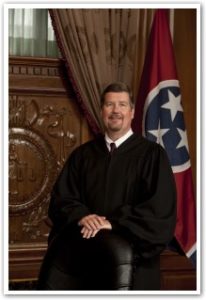TN Supreme Court: Political party executive committees not subject to open meetings law
The Tennessee Supreme Court ruled Friday that the open meetings law applies to political parties’ primary boards, but not their executive committees when the committees are determining the “bona fides” of a potential candidate.
The ruling overturns a lower court interpretation of the statute. Just a week ago, a Davidson County Chancellor invalidated the Tennessee Republican Party’s decision that Robby Starbuck was not a bona fide Republican because the decision was not made in a meeting open to the public in accordance with the open meetings act. The ruling looked like it might provide a way for Starbuck to run as a Republican in the newly redrawn 5th Congressional seat.
1976 statute makes some political party meetings subject to open meetings law
At issue was a 1976 statute that says each political party’s state primary board is subject to the Tennessee Open Meetings Act (TOMA). The statute also says that each political party shall have a “state executive committee which shall be the state primary board for the party” and “the state primary board shall perform the duties and exercise the powers required by this title for its party.”
Chancellor Russell Perkins said the statute meant that a political party’s state primary broad was responsible for all “duties and powers” of the party outlined in Title 2 — the part of Tennessee law governing elections. One of those powers is to decide whether a Republican candidate is a bona fide member of the party for purposes of being on a primary ballot. Because the primary board is the executive committee, Perkins said the executive committee was subject to the open meetings act when it made its Starbuck decision.
The Republican party appealed and the Tennessee Supreme Court quickly took jurisdiction of the case on an extraordinary appeal as a deadline approached to get the August primary ballot prepared in time for mailing to overseas military members.
“In finding a TOMA violation, the trial court ruled that state executive committees and state primary boards are ‘synonymous’ under Title 2. We disagree. The statutory scheme clearly provides for and distinguishes between state executive committees and state primary boards, and it confers upon each distinct entity differing obligations and responsibilities.”
Court: State primary boards and executive committees not the same
The ruling, delivered by Justice Jeffrey Bivins, included a list of statutory provisions that describe the responsibilities of the executive committee and those of the primary board.
For example, if a political party’s candidate becomes unavailable and the office is to be filled by the voters of the entire state, the party’s executive committee decides the method of nomination. The party’s state primary board is charged with hearing and determining the results of a primary election in which a candidate contests the results.
“Under Tennessee Code Annotated section 2-5-204(b)(2), a party’s state executive committee makes the determination of whether a candidate is a bona fide member of the party. Thus, the TRP SEC (Tennessee Republican Party State Executive Committee), by statute, was acting as a state executive committee, and not a state primary board, when it determined that Mr. Starbuck was not a bona fide Republican. As a result, the TRP SEC did not violate TOMA (Tennessee Open Meetings Act) by making that determination in a non-public meeting because it was not required to comply with TOMA.”
The ruling ended what had been a dramatic turn of events for Starbuck who had lost an effort in federal court to get returned to the ballot and then filed a lawsuit in state court on the open meetings and other claims. He prevailed only in Perkins’ court on the open meetings claim. Perkins ruling nullifying the committee’s decision is required for decisions made in violation of the open meetings law.
The Tennessee Republican Party could have attempted a “cure meeting” in which they held another meeting, this time in compliance with the open meetings law, allowing debate and the public to be heard before deciding again. But instead, the party appealed, arguing that Perkins had misinterpreted the statute.
The Supreme Court’s ruling today provides clarity on the breadth of the statute’s application.
The 5th Congressional District is competitive for Republicans this year. Though once solidly Democrat and based in Nashville, the district was redrawn by the General Assembly this year by splitting it into three parts and matching the southern portion with other suburban and rural counties to form the 5th.




